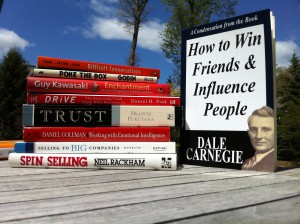The Limits of Rational Trust: Part 2
Last week we talked about how rational trust, which is to say, being trustworthy because it can be shown that being trustworthy leads to more money or other benefits, can break down, either because a the person involved knew they wouldn’t be around for the long term, or because the reward for betraying a trust was so great that they could cash out.
Other failures of rational trust are:
- When you’re not at the table, but on the table;
- when the social mechanisms of reputation and deterrance break down;
- when someone has a dominant strategy, something they can force on other people.
This post we’ll discuss not being at the table, and the breakdown of social mechanisms of trust.
Are you the roast beef being carved up?
It is rational to be trustworthy to people who are your customers because you want repeat business. But often even if you’re buying something, you aren’t the customer. So, for example, who are the customers for credit cards?
Here’s the odd thing about credit cards. Credit cards which charge merchants more, and that therefore also cost consumers more, since merchants have to pass those costs on, are the ones that are chosen by banks to be offered. Chosen by banks is the key phrase. Almost everyone gets their credit card through their bank. The banks control the pipeline, therefore the banks are the actual consumers. They, and the credit card companies are at the table, retailers and consumers are on the table. The real customer for credit cards isn’t consumers, and it isn’t businesses, who feel they must accept them or give up huge amounts of business, instead it is the banks. Since this is the case, it is rational to charge consumers and businesses more, not less, because the more you charge them, the more you can give to the real customer, the banks, who can deliver what amount to captive audiences.
Just because you’re buying something doesn’t mean you’re the customer, it just means you are paying.
Heads I win, tails you lose!
The next failure point of rational trust is when the social mechanisms for enforcement break down. If CEOs can materially misrepresent their company’s positions, and still be paid millions, if outright systemic fraud can occur throughout an industry, for example, mortgage origination and packaging during the housing bubble, and virtually no one is charged with a crime, and many of the companies which engaged in the fraud are bailed out at taxpayer expense, then why shouldn’t they engage in fraud?
Call it “heads I win, tails you lose”. If I know that I’ve done so much damage that the entire world’s economy is at risk, well, what’s to fear? On Wall Street they used to call this the “eat babies” scenario, which is to say, if the government didn’t step in, things would be so dire that everyone would be eating babies. Apocalytpically bad. Now, one can argue over whether failing to bail out Wall Street would have been so bad (I don’t think so), but it certainly seems the prime actors thought it would be, and unquestionably many actors at the Federal Reserve, Treasury and in power in DC thought it would be.
In capitalism, the joke runs, bankrupt companies go out of business. On Wall Street, they get bailed out. The political mechanism, which is ultimately a social mechanism, for enforcing law and basic capitalist principles broke down.
This has far less grandiose forms than the late financial crisis. It occurs any time when breaches of trust will not materially affect someone’s ability to continue to operate in business and to make money. If the social circle one moves in doesn’t care about breaches of trust or ethics, then it is rational not to care about either. Rational trust is about consequences, if the consequences are less than the benefits, why be trustworthy?
Next post: Dominant strategies, or “you’ll take this deal because you have no choice.”

 They wanted to sell a used truck. My son wanted to buy one for his business. He asked me to come along to help negotiate.
They wanted to sell a used truck. My son wanted to buy one for his business. He asked me to come along to help negotiate. The other night I met Kevin. Kevin is a late forty-something career consultant; for all but a few years of his career, he spent his work-weeks in various cities away from his wife and son.
The other night I met Kevin. Kevin is a late forty-something career consultant; for all but a few years of his career, he spent his work-weeks in various cities away from his wife and son. Get the Trust Primer volume 11 here
Get the Trust Primer volume 11 here Which of these statements resonates more with you?
Which of these statements resonates more with you? “I helped Maia and Maia helped me”… was the breathless comment of a three year old at the end of a very successful Easter egg hunt recently; she had formed a partnership with an equally ambitious four year old egg-hunter to be clear winners in the task of finding (and consuming!) as many Easter eggs as possible.
“I helped Maia and Maia helped me”… was the breathless comment of a three year old at the end of a very successful Easter egg hunt recently; she had formed a partnership with an equally ambitious four year old egg-hunter to be clear winners in the task of finding (and consuming!) as many Easter eggs as possible. The first tranche of the
The first tranche of the 
 This is one of my all-time favorite stories. Three umpires (baseball, for our international readers) were talking about how they make calls on each pitch.
This is one of my all-time favorite stories. Three umpires (baseball, for our international readers) were talking about how they make calls on each pitch. This is the first in a new series called Books We Trust. We expect to publish it irregularly, but about monthly.
This is the first in a new series called Books We Trust. We expect to publish it irregularly, but about monthly.